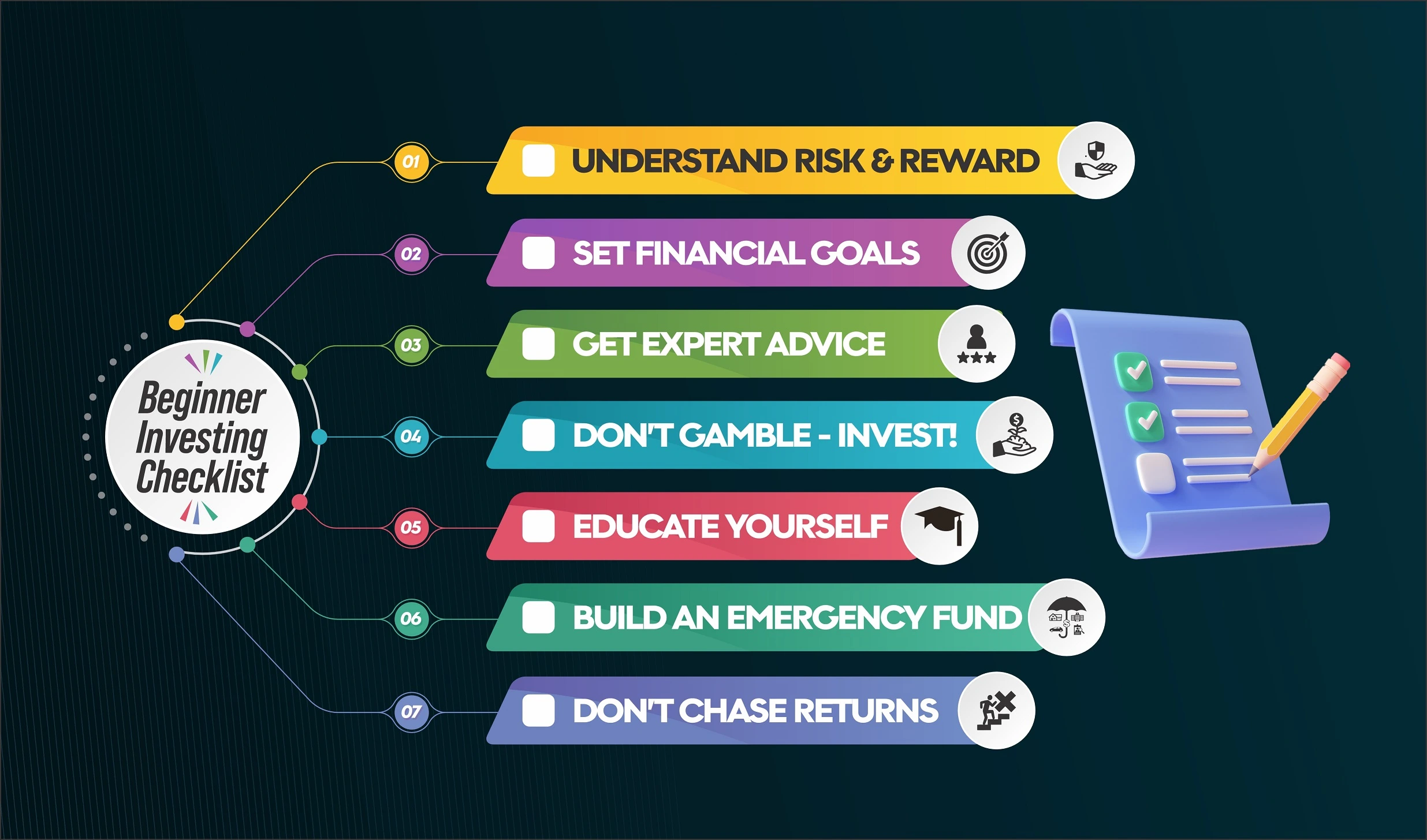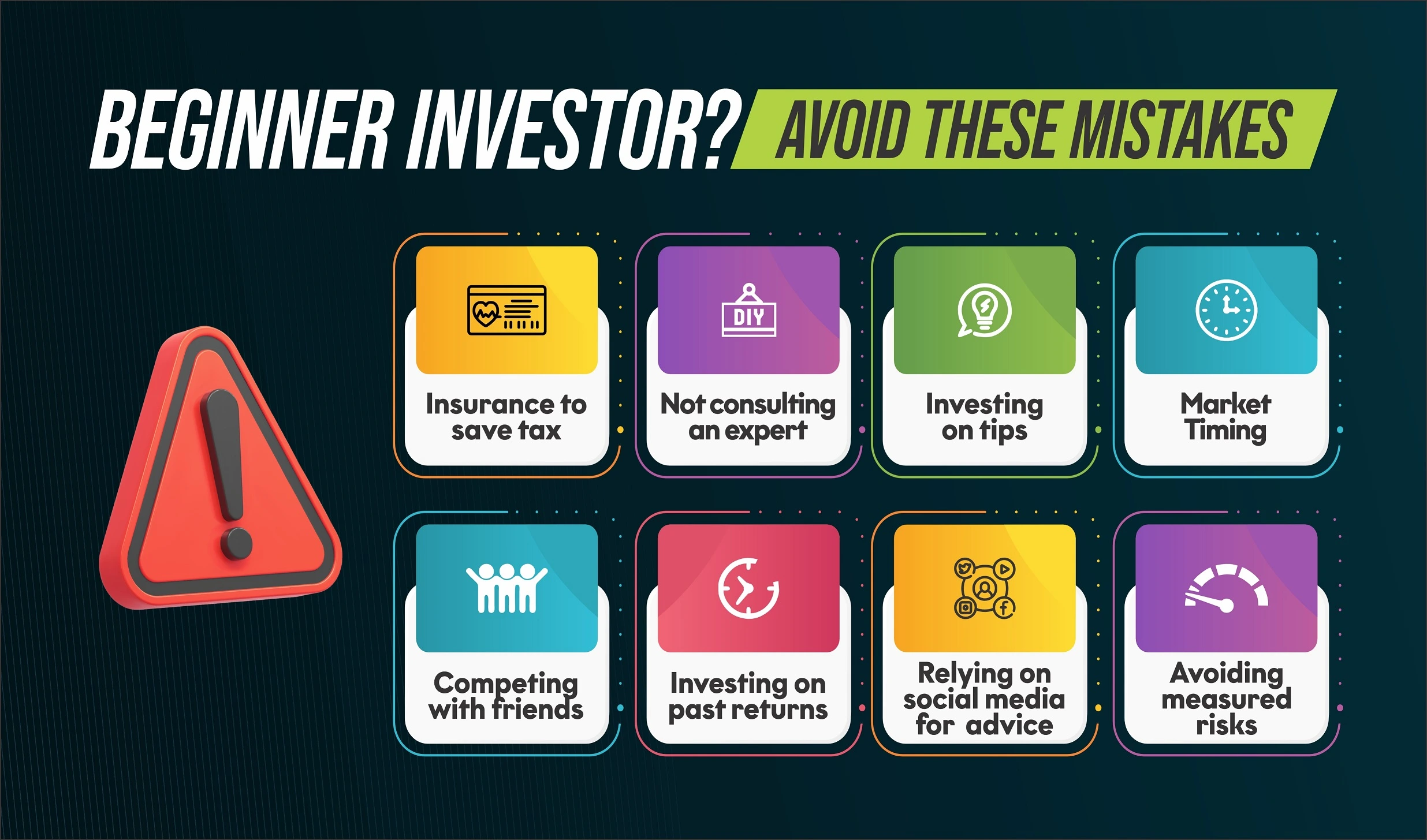Beginner Investing Guide
 Investing for beginners can be an exciting and potentially rewarding journey, but it's important to approach it with careful consideration and a solid understanding of the basics. Here's a step-by-step guide to help you get started.
Investing for beginners can be an exciting and potentially rewarding journey, but it's important to approach it with careful consideration and a solid understanding of the basics. Here's a step-by-step guide to help you get started.
Set Clear Goals: Set clear financial goals for investing. Are you saving for retirement, a holiday, a new car, the down payment on a home, or just looking to grow your wealth? Your goals will influence your investment strategy. The clearer your goals, the better your chances of success.
Educate Yourself: Before you start investing, take the time to learn about different investment options and basic financial concepts. There are plenty of online tools and resources available for this.
Build an Emergency Fund: Before you start investing, make sure you have an emergency fund with enough money to cover 3 to 6 months' worth of living expenses. This will provide a safety net in case of unexpected financial setbacks. Do not speculate with these emergency funds – park them in a safe asset like a fixed deposit or arbitrage fund.
Avoid High-Interest Debt: If you have high-interest debt (like credit card debt), prioritize paying it off before you start investing. The interest on these debts can often outweigh potential investment gains. Also, never invest with borrowed money, however lucrative the investment opportunity may look like!
Start your Journey!
Why Mutual Fund SIP’s are a great investment for beginners
 Equity based Systematic Investment Plans (SIP’s) are an excellent long term wealth creation tool for beginners. A SIP is an ‘automatic’ monthly investment of a fixed amount in a mutual fund. The first purchase takes place via cheque, and the subsequent monthly purchases take place directly via an NACH request submitted to your bank. You can specify which date of every month you’d like the ECS debit to take place, based upon your individual convenience. By combining three powerful features – namely, Compounding, Rupee Cost Averaging & Discipline, equity SIP’s offer unbeatable potential for long term growth. The best part is that you do not need market knowledge to be successful with SIP investing – all you need is investing discipline and clearly defined goals
Equity based Systematic Investment Plans (SIP’s) are an excellent long term wealth creation tool for beginners. A SIP is an ‘automatic’ monthly investment of a fixed amount in a mutual fund. The first purchase takes place via cheque, and the subsequent monthly purchases take place directly via an NACH request submitted to your bank. You can specify which date of every month you’d like the ECS debit to take place, based upon your individual convenience. By combining three powerful features – namely, Compounding, Rupee Cost Averaging & Discipline, equity SIP’s offer unbeatable potential for long term growth. The best part is that you do not need market knowledge to be successful with SIP investing – all you need is investing discipline and clearly defined goals
As a beginner investor, customization is critical for investing success. Sith SIP’s One can tailor make their time horizon, stop & restart the SIP whenever they want and redeem fully or partially in most mutual funds (subject to exit loads). This is where they score over other traditional savings tools such as PPF.
Compounding & SIP Investing
Compounding can be best described as ‘returns earned on returns’. By accruing profits within your portfolio over a 10-15 year time frame rather than redeeming (and spending!) the profits periodically, you can reap the magic of compounding, which Einstein termed as the ‘eighth wonder of the world’!
To illustrate with a simple example, a monthly SIP of Rs. 10,000, when allowed to compound over 25 year time (30 Lakhs saved in total) will grow 7.5 times to 2.25 Crores at a CAGR of 13% per annum! In order to reap the benefits of compounding, remember to always opt for the ‘Growth’ option (instead of ‘Dividend’) in your Equity SIP.
Rupee Cost Averaging and SIP Investing
Rupee Cost Averaging is a wonderful risk mitigation mechanism which is ideal for beginner investors. In theory, we all know that we should buy more of something when it’s cheap, and less of it when it’s expensive. In real life, emotions make us to do the exact opposite! By investing a fixed sum of money every month regardless of the price of the units, you end up purchasing more during market downturns and lesser units during bullish phases. This ensures that the average buying price of your units is neatly averaged out, thereby providing you with relatively stable growth over the long term.
Discipline – the success secret for beginner investors
Warren Buffett discerningly advised us to “not save what’s left after spending, but to spend what’s left after saving”. Financial Planning studies over the years have proven that those who save for their goals in a disciplined manner (a fixed amount each month in an inflation beating asset, on autopilot, regardless of expenses) end up taking on fewer loans and achieve their future goals more easily. SIP’s help enforce a disciplined savings habit.
SIPs- Things to keep in mind for beginner investors
In order to fully reap its benefits, an Equity SIP must continue in a disciplined manner (without repeated stoppages and starts) for a period of seven to ten years. One needs to maintain strict discipline and not get carried away by market cycles and break the SIP cycle – as this can impact future returns detrimentally. Since risk and returns go hand in hand, SIP’s will give you lower returns than lumpsum investments during secular bull markets. Obviously, the volatility will be significantly reduced as well.
Attain Financial Freedom
FAQs – Investing for Beginners
How a beginner should start investing?
If you are a beginner investor, start with the basics. Get your cash flows in order, pay off high cost debt and map your goals. Do not fixate on selecting the best mutual fund or stock. If you get the investing process right, wealth creation will follow.
How do I start investing with little money?
The best way to start investing small sums of money is through mutual fund SIP’s (systematic investment plans). You can start with as little as Rs. 500 per month. However, please make sure that you understand the risks and rewards associated with mutual funds before you start your SIP. Setting the right expectations is key.
How can I start investing on my own?
As a beginner investor, it is not advisable to start investing on your own. Seek the support of a qualified expert who will help you define your goals clearly and invest in the right products that match your investment objectives.
Is Day Trading a good investment for beginners?
The odds of succeeding as a day trader over the long term are actually very, very small. In fact, a recent study by SEBI showed that 90% of traders end up losing money! Day trading can give you some thrills, but in the end its just gambling and nothing else. As a beginner you may encounter some “beginners luck”, but that will most probably taper off over a few weeks.
Is crypto a good investment for beginners?
Crypto is a highly speculative investment that is not fully understood. As a beginner, it is advisable to stick with tried and tested investments like mutual funds, blue chip shares or traditional fixed income instruments.